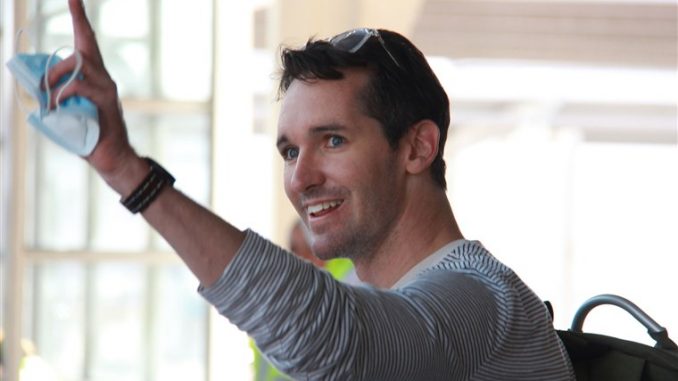
Two Australian journalists were flown out of China after being questioned by intelligence agents, their employers said Tuesday, amid growing tensions between Beijing and the West.
Correspondents for the Australian Broadcasting Corporation and the Australian Financial Reviewsought shelter in the Australian Embassy in Beijing and the consulate in Shanghai, as diplomats negotiated with Chinese officials to allow them to leave, according to a statement from the Australian Foreign Ministry.
“It’s nice to be home but deeply disappointing to leave China under such abrupt circumstances. It’s been a big part of my life and the past week was surreal,” the Australian Broadcasting Corporation correspondent Bill Birtles said on Twitter.
A spokesperson for China’s Foreign Ministry said in a press briefing Tuesday that the two journalists had been questioned by the relevant Chinese authorities as part of the “normal enforcement of law,” which had been strictly adhered to during their investigations.
Chinese officials did not say why the two journalists had been questioned, or provide further comment.
In a personal essay published later on Tuesday, Birtles said he had been questioned about fellow Australian citizen and TV anchor Cheng Lei. Cheng is a high-profile business journalist on CGTN, an English-language Chinese state media channel, who was detained in China last month, according to Chinese authorities.
Let our news meet your inbox. The news and stories that matters, delivered weekday mornings.
A spokesperson for China’s Foreign Ministry said Cheng was being held on suspicion of endangering national security.
“The Australian national Cheng Lei is suspected of carrying out criminal activities endangering China’s national security, and compulsory measures have been taken and an investigation is underway by the relevant authority,” spokesman Zhao Lijian said at the briefing.
The Australian Foreign Ministry said Tuesday it was providing consular support to Cheng.
Earlier this year, Australia angered China by calling for an international inquiry into the source of the coronavirus pandemic, with Beijing threatening trade reprisals as diplomatic relations worsened. China viewed Canberra’s call as a political maneuver targeting Beijing.
The White House has also criticized China over its handling of the virus, while President Donald Trump and others in his administration have used terms such as the “Chinese flu” or “China virus” to describe the disease, angering Beijing.
Both China and Australia have since joined the 194-member World Health Assembly in calling for an “impartial, independent and comprehensive” inquiry into the COVID-19 pandemic.
The spat comes amid a wider strain in relations between the United States and Chinasince the outbreak of the coronavirus pandemic this year. The two powers have also butted heads on issues of trade, Hong Kong’s autonomy, Taiwan and the South China Sea.
The Foreign Correspondents’ Club of China, a professional association, said Tuesday the effort to keep foreign journalists in China against their will, marked a significant escalation of the government’s “assault on media freedoms.” It criticized the “use of foreign journalists as pawns in wider diplomatic disputes.”
Seventeen foreign journalists have been expelled from China in the first half of 2020, according to the association, with no accredited foreign journalist now remaining in the country for an Australian news outlet. At least five journalists at U.S. news organizations have also been affected in recent days, including The Wall Street Journal, CNN and Bloomberg.
In March, China expelled American journalists from The New York Times, The Wall Street Journal and The Washington Post, a month after the U.S. said it would begin to treat Chinese state-run media entities with U.S. operations the same as foreign embassies.
The U.S. move reduced China’s media personnel in America to about 100, a de facto expulsion of 60 Chinese journalists. The U.S. has also delayed and denied visa renewals and the accreditation of at least 30 Chinese journalists in the U.S. since 2018, according to Chinese officials.
“It is the U.S. that has been escalating political repression of Chinese news outlets,” China’s Foreign Ministry spokesperson Zhao Lijiansaid on Twitter on Monday. “If (the) U.S. does care about its journalists, it should extend visas for Chinese journalists.”
Press card renewals for CNN and other U.S. media journalists were “being processed,” Zhao said on Twitter, adding that “their reporting and life in China will not be affected in any way.”
*story by NBC News